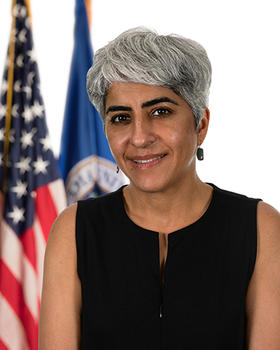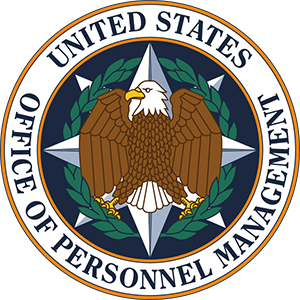
The country’s largest workforce—the federal government—is hiring.
“Yes, there are jobs,” said Kiran Ahuja. “There are lots of jobs in government. You can find an opportunity with the federal government.”
Ahuja should know: She’s the director of the U.S. Office of Personnel Management (OPM), the agency that serves as the chief human resources and personnel policy manager for the federal government, representing a national workforce of some two million federal employees, the nation’s largest.
The Schar School of Policy and Government is honored to present Ahuja as the 2023 Degree Celebration speaker on May 19 at 2 p.m. at EagleBank Arena.
Ahuja, who is the first South Asian American and first Asian American woman to lead the agency, was appointed by President Joe Biden and sworn into office in June 2021. And while her story is an inspirational career-federal employee success story, she wants the Schar School Class of 2023 to know the government has positions that represent more than a paycheck.
In an ideal job, she said, “you’re really focused on feeling like you’re connected to something that’s mission-oriented, that feels like you can make a real impact. And I may be biased here, but I think you can do it in the federal government.”
In addition, she added, “the kind of people that you work with are all very focused on serving the American public, and dedicated to ensuring we have a society that works well—and works well for all. You have that kind of dedication inside the government.”

She said she’s looking forward to addressing the Schar School’s newest graduates for several reasons, not the least of which is to address an aging federal workforce.
“The median age of the federal workforce is mid-50s,” she said. “Less than 8 percent of the workforce is under age 30, so we want to bring in that early career talent. We want to think about succession planning, and how we think about the leadership of now and tomorrow. Schools like Mason that are focused on educating a diverse student population, with its proximity to Washington, D.C., and the range of degrees you can get at Mason, is pretty astounding.”
That diversity is key, she said.
“We need a diversity of voices and experiences, and especially at [George Mason University] you have students that range across the ages who have that diversity.”
The federal government, Ahuja pointed out, “has a history of building the middle class in this country, especially for communities of color when opportunities were not available for everyone in the private sector. We stand on that history, and especially now, when [employees] are looking for stability and good benefits—we’re really positioning the federal government as a model employer by providing all the things we think are meaningful.”
Ahuja came to Washington—and the federal government—straight from law school at the University of Georgia. “I wanted to be doing policy work,” she said of her ambitions, “but my first job was in the Civil Rights Division at the Department of Justice as a litigator.”
As it happened, “it was my dream job…Growing up in the South in the wake of the civil rights era was very formative experience for me. And the history of civil rights laws of the government being a force for good was the kind of work I thought I could be doing at the Department of Justice. I ended up representing the United States in those longstanding desegregation cases that were still existing in so many different school districts around the South.
“It was a job I wanted. And it was meaningful to have that as my first experience.”
